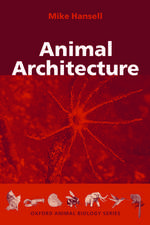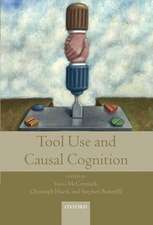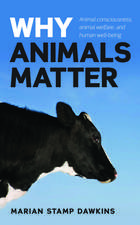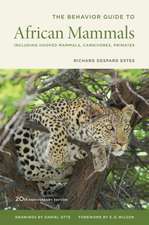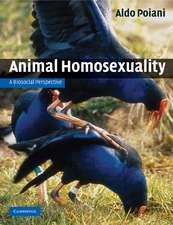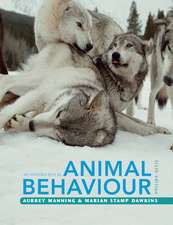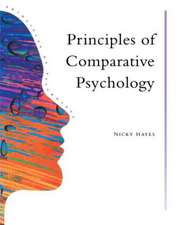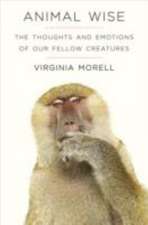Mind the Gap: Tracing the Origins of Human Universals
Editat de Peter Kappeler, Joan Silken Limba Engleză Paperback – 18 noi 2009
Preț: 950.63 lei
Preț vechi: 1159.31 lei
-18% Nou
Puncte Express: 1426
Preț estimativ în valută:
181.89€ • 189.93$ • 150.21£
181.89€ • 189.93$ • 150.21£
Carte tipărită la comandă
Livrare economică 15-29 aprilie
Preluare comenzi: 021 569.72.76
Specificații
ISBN-13: 9783642027246
ISBN-10: 3642027245
Pagini: 524
Ilustrații: XX, 504 p. 27 illus., 3 illus. in color.
Dimensiuni: 155 x 235 x 31 mm
Greutate: 0.75 kg
Ediția:2010
Editura: Springer Berlin, Heidelberg
Colecția Springer
Locul publicării:Berlin, Heidelberg, Germany
ISBN-10: 3642027245
Pagini: 524
Ilustrații: XX, 504 p. 27 illus., 3 illus. in color.
Dimensiuni: 155 x 235 x 31 mm
Greutate: 0.75 kg
Ediția:2010
Editura: Springer Berlin, Heidelberg
Colecția Springer
Locul publicării:Berlin, Heidelberg, Germany
Public țintă
ResearchDescriere
This volume features a collection of essays by primatologists, anthropologists, biologists, and psychologists who offer some answers to the question of what makes us human, i. e. , what is the nature and width of the gap that separates us from other primates? The chapters of this volume summarize the latest research on core aspects of behavioral and cognitive traits that make humans such unusual animals. All contributors adopt an explicitly comparative approach, which is based on the premise that comparative studies of our closest biological relatives, the nonhuman primates, provide the logical foundation for identifying human univ- sals as well as evidence for evolutionary continuity in our social behavior. Each of the chapters in this volume provides comparative analyses of relevant data from primates and humans, or pairs of chapters examine the same topic from a human or primatological perspective, respectively. Together, they cover six broad topics that are relevant to identifying potential human behavioral universals. Family and social organization. Predation pressure is thought to be the main force favoring group-living in primates, but there is great diversity in the size and structure of social groups across the primate order. Research on the behavioral ecology of primates and other animals has revealed that the distribution of males and females in space and time can be explained by sex-speci?c adaptations that are sensitive to factors that limit their ?tness: access to resources for females and access to potential mates for males.
Cuprins
Primate Behavior and Human Universals: Exploring the Gap.- Family & Social Organization.- The Deep Structure of Human Society: Primate Origins and Evolution.- Conflict and Bonding Between the Sexes.- The Unusual Women of Mpimbwe: Why Sex Differences in Humans are not Universal.- Politics & Power.- Dominance, Power, and Politics in Nonhuman and Human Primates.- Human Power and Prestige Systems.- The End of the Republic.- Intergroup Relationships.- Intergroup Aggression in Primates and Humans: The Case for a Unified Theory.- Why War? Motivations for Fighting in the Human State of Nature.- Foundations of Cooperation.- From Grooming to Giving Blood: The Origins of Human Altruism.- Evolved Irrationality? Equity and the Origins of Human Economic Behavior.- From Whence the Captains of Our Lives: Ultimate and Phylogenetic Perspectives on Emotions in Humans and Other Primates.- Language, Thought & Communication.- Primate Communication and Human Language: Continuities and Discontinuities.- Language, Lies and Lipstick: A Speculative Reconstruction of the African Middle Stone Age “Human Revolution”.- Brain and Behaviour in Primate Evolution.- The Gap is Social: Human Shared Intentionality and Culture.- The Evolution and Development of Human Social Cognition.- Deceit and Self-Deception.- Human Universals and Primate Symplesiomorphies: Establishing the Lemur Baseline.- Innovation & Culture.- Ape Behavior and the Origins of Human Culture.- The Coevolution of Genes, Innovation, and Culture in Human Evolution.- Conclusions.- Mind the Gap: Cooperative Breeding and the Evolution of Our Unique Features.
Recenzii
From the reviews:
“This edited, 22-chapter volume organizes contributions by experts from a wide range of disciplines … to address the origins and evolution of human universals--specifically, those behavioral and cognitive features that make humans a distinct species from other primates. … In looking for evidence of both convergence and common descent in specific traits, as is common in comparative primatology, contributors make a very strong effort to evaluate the available evidence for evolutionary continuity in human social behavior. … Summing Up: Recommended. Upper-division undergraduates through researchers/faculty.” (R. A. Delgado Jr., Choice, Vol. 47 (11), August, 2010)
“Mind the Gap, Tracing the Origins of Human Universals … a collection of contributions dealing with the issue of human uniqueness from a multidisciplinary perspective. … Mind the Gap brings together most of the ‘hot’ topics in primatology, along with interesting contributions from cultural anthropology, and, notably, draws our attention to two critical and frequently omitted aspects of comparative research, namely the importance of studying species that are evolutionarily distant from humans, and not only the great apes, and the need for more cross-cultural research.” (Elsa Addessi, Metascience, Vol. 20, 2011)
“This edited, 22-chapter volume organizes contributions by experts from a wide range of disciplines … to address the origins and evolution of human universals--specifically, those behavioral and cognitive features that make humans a distinct species from other primates. … In looking for evidence of both convergence and common descent in specific traits, as is common in comparative primatology, contributors make a very strong effort to evaluate the available evidence for evolutionary continuity in human social behavior. … Summing Up: Recommended. Upper-division undergraduates through researchers/faculty.” (R. A. Delgado Jr., Choice, Vol. 47 (11), August, 2010)
“Mind the Gap, Tracing the Origins of Human Universals … a collection of contributions dealing with the issue of human uniqueness from a multidisciplinary perspective. … Mind the Gap brings together most of the ‘hot’ topics in primatology, along with interesting contributions from cultural anthropology, and, notably, draws our attention to two critical and frequently omitted aspects of comparative research, namely the importance of studying species that are evolutionarily distant from humans, and not only the great apes, and the need for more cross-cultural research.” (Elsa Addessi, Metascience, Vol. 20, 2011)
Textul de pe ultima copertă
What makes us human? What made us become the way we are? One way to answer these questions is to identify the traits that all humans share, traits that are universal features of all human societies. Another way to do so is to ask how humans differ from other species, particularly from our closest relatives, the nonhuman primates. The contributors to this book pursue both approaches, in an effort to understand how evolution has shaped modern human behavior and societies.
Caracteristici
Explicit attempt to examine the evolutionary origins of traits that are found in all human societies (human universals)
Helps to identify the traits that we share with other primates as well as the traits that distinguish us from other primates so that we gain a deeper insight into what it means to be human
Helps to identify the traits that we share with other primates as well as the traits that distinguish us from other primates so that we gain a deeper insight into what it means to be human



